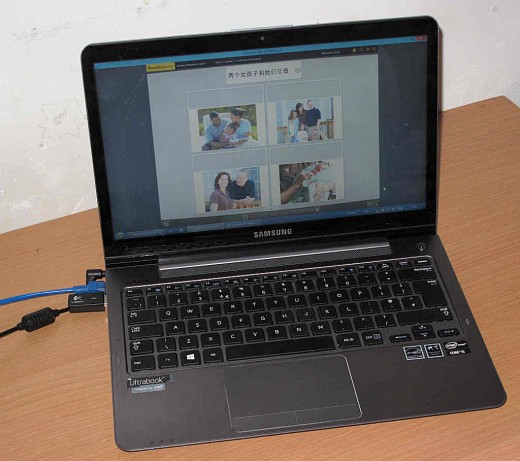Learning Mandarin Chinese - is it Even Possible!!??
Hi,
I'm Brett, and a three years ago I decided that life wasn't actually too short to start learning Mandarin Chinese.
So how is my progress to date?
Ummmmmm......
Well I'm slowly learning, but I'm some considerable way off being fluent!
In this article I'll list some of the ways I've tried of learning Chinese, and discuss what's the best way of learning this tricky language.
Learning Chinese - is it worth the effort?
Chinese Teachers - Classroom Based Courses
If you're serious about learning Mandarin Chinese, then I can recommend you get started by finding a classroom based course. If you want to learn to speak Chinese then it is absolutely essential that you get the sound of the syllables and tones right. And for that it's hard to beat a lesson, in person, from an actual native speaker.
Once you've mastered the tones and the basic grammar, then self study is usually good enough for expanding your vocabulary and learning how to read Chinese characters.
Learn Chinese in Your Own Country
When I lived in England, I found that my local University ran a Mandarin Chinese course. The course was just a basic introduction to the language, but I learned a lot. It helped that the teacher was absolutely excellent, and her infectious enthusiasm meant that we students couldn't fail to learn a lot from her.
Mandarin courses are generally quite easy to find in larger towns and cities. Look in your local University, or maybe you can find an evening class.
Failing that, many Chinese people live overseas so you shouldn't have too many problems in finding a teacher who lives locally and can give you some private lessons.
Or maybe you could try finding an online Chinese teacher, like one of those cute girls over at SexyMandarin.com!
Learn Chinese in China
This is the approach I'm currently taking. I'm enrolled as a student at one of Guangzhou's many universities. With 20,000+ students and a beautiful campus full of lush tropical trees, it's a great environment for studying.
Studying in China is much cheaper than studying in a Western country. And I'm benefiting from total immersion in my language studies. If I want to practice my oral Chinese, I just need to walk two minutes down the road to my local supermarket or restaurant!
Worried about costs? If you're a younger person in particular then you'll find that it's not too hard to find scholarships to cut the cost of your course fees while you study in China. If you're thinking about studying for a degree, then why not look for a course that allows you to spend a semester or a whole year studying abroad in China?
I'll let you into a secret. There are very few foreigners currently studying in China. For example, there are only two other students from the UK in my Chinese university. Study in China and you'll potentially give your future career a huge boost by spending time living in the world's second largest economy!

The downsides to studying in China?
Well I'm learning Mandarin Chinese in Guangzhou, and the language is widely spoken here, but it's not that widely used. The local population are predominantly Cantonese, and they will tend to speak to each other using Cantonese. This makes it hard to get free Mandarin listening lessons when I'm riding on the bus, as very often my fellow passengers will normally be shouting to each other in Cantonese.
Guangzhou is also a very cosmopolitan city and the many migrants from elsewhere in China speak a wide variety of languages and dialects.
So if you're a language purist, then I recommend you learn Mandarin in somewhere it's more widely spoken - like Beijing for example.
Also since teachers are human, some are invariably better than others.
Finally, Chinese natives who teach Chinese don't always speak good English, or any English at all. This can be a big problem when they're trying to explain Chinese grammar to you!
Fun Mandarin Learning Resources!

Rosetta Stone
Rosetta Stone is a well known system for learning languages. They have a number of software applications available for a range of languages. Mandarin Chinese is just one of the languages they cover. Strangely though, they don't have anything available for Cantonese.
This seems a little odd given that there are at least 80 million Cantonese speakers living in China alone!
Rosetta Stone is expensive, there's no doubt about that. But the package is polished and looks way better than any other language learning tool out there.
It takes a novel approach to learning a language. There's no vocabulary to learn, and there's no explanation of grammar. Instead you're just shown photos of things and you're expected to work out what the words for them mean. This is just like a baby picks up the language spoken by his or her parents.
This works great for things like cats, dogs and bicycles. However, I've found a few of their photos to be less obvious. Especially when it comes to things like police officers (who wear different uniforms in different countries), or things like home interiors (which I'm really struggling with right now).
I do like Rosetta for three reasons though:
- Firstly, the lessons are reasonably short, and I can fit them into my busy schedule.
- Secondly, the endless repetition of words is exactly what you need to commit them to long term memory.
- Thirdly, it roughly follows the syllabus of my classroom based Chinese courses. Many of the words Rosetta has been teaching me are words I've also encountered in my classes. As a result, it's an ideal companion to a teacher based Mandarin course.

Flash Cards
Home study is the best way of learning how to read Chinese. And Flash cards are a really nice way of memorising the many Chinese characters you need to know if you want to read or write Chinese.
The best Flash cards I've seen are those from Tuttle. The cards are small enough to carry around, and also fairly robust. Tuttle have four packs of these cards available, which comes to over 2000 cards in total. Master the first box of cards and you'll be able to read an awful lot of Chinese.
My Chinese teacher thought the cards were expensive, and used to make her own. But that's only for people with a heck of a lot of time on their hands!
Using the Tuttle Flash cards I was able to learn the meaning of around 150 characters. I can often work out the meaning of many street signs and read a few bus timetables. But I'm a long way from being a fluent Chinese reader.
The downside is that after a while the pile of cards you need to memorise gets larger and larger and eventually you grind to a halt. It really takes a lot of effort to commit Hanzi characters to memory.
And Flash cards don't really help with remembering how to write characters by hand. For that there's really only one approach that works - hard graft! Write characters enough times and you'll remember them. After all, this was how you learnt to write the English alphabet.

Pimsleur
Pimsleur is another approach to learning a foreign language. I've not really had much of a look of this, but I'd recommend you give it a try.
The nice thing about the Pimsleur approach is that it drops you into the deep end, giving you real world scenarios to listen to. So any Chinese you manage to learn from using the Pimsleur technique is going to be a tremendous help if you actually find yourself visiting a Chinese speaking country.
Being audio based, it's also a great fit for the modern world of Podcasts and iPods.
Chinese Pod
Another popular resource for learning Chinese is Chinese POD. Again, I haven't tried this, mainly because I'm already overwhelmed with so many language learning materials. And since I now live in China, my whole environment is my classroom.
If your financial means are limited, then Chinese Pod is well worth a look.
Find a Chinese Friend (or Boyfriend or Girlfriend!)
To get better at a foreign language, you need to use it!
And what better way of practicing Chinese by chatting to a native Chinese speaker?
I've actually been on dates with a couple of Chinese ladies who spoke little or no English. In both cases my Mandarin was better than their English.
Needless to say it was brutally hard work trying to chat to them!
But by putting myself in a situation when I had to use the language, I really improved my speaking and listening skills. I've found that speaking is a great way of learning how to take individual words and form sentences out of them. This is how to become fluent in a language.

My Mandarin Learning Woes
Mandarin is hard to learn for so many reasons.
Being a tonal language it's really essential to get those tones dead on, otherwise native speakers will have great difficulty in understanding you.
The good news is that American, Canadian and British people all seem to possess the vocal skills for speaking Mandarin well. Being from the English west country, I'm having to rediscover how to roll my R's like the rural natives do. The only particular difficulty I've had is in distinguishing the Z's from the X's and C's.
One other problem I've had is that standarised Mandarin only exists in textbooks. Hardly anyone actually speaks it! Like English, Mandarin has different words for things, and it's really hard for you to know this from reading your English/Chinese dictionary. To make matters worse, the Mandarin spoken in different parts of China tends to be pretty variable.
Finally, one problem with Chinese is because pronunciation is so critical, I have to put up with a lot of Chinese people correcting me when I say words wrongly. This greatly reduces my confidence and can make me reluctant to speak any Chinese at all. Still, I will persevere. Chinese friends are telling me that my Chinese speaking is improving all the time.
The Secret of Learning a New Language?
As for the secret of learning a new language, well there's no secret really.
Learning a language requires two things: time and dedication.
I've found learning Chinese to be very time intensive.
The other thing you need is dedication. Rather than learning a language for the sake of it, it's good to have a clear goal. Like learning enough of a language to be able to get a better job, or to find a partner from another country, or to be able to go an live overseas for a while.
But if you're determined to give it a go, then Mandarin Chinese *is* possible to learn. And being able to understand one of the most widely spoken languages on the planet will open up all kinds of opportunities for you, as it is for me.
So good luck with your language learning goals. If you have any tips or questions about learning Chinese then leave your comments below.









